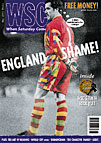 A fans' pressure group has come to the fore in Italy recently. Roberto Gotta explains who they are and what they want
A fans' pressure group has come to the fore in Italy recently. Roberto Gotta explains who they are and what they want
The recent upheavals in Italian football – the players’ strike and the battle over the control of TV rights – produced a curious side effect: FISSC’s name was in the papers again, as big a surprise as a postcard from a long lost relative.
FISSC (Federazione Italiana Sostenitori Squadre Calcio) is the official umbrella organization for Italian supporters’ clubs. They represent 5,000 clubs totalling one million members and have been in existence for twenty years, but they have never been a major player in football politics.
You never used to hear or read about them, or even see any of their representatives in those depressing whoever-screams-loudest-is-right TV sports talkshows. At matches, FISSC members help club stewards, hurl mild abuse at the ref if their team isn’t winning, then go home to watch the highlights on TV. Whenever something really bad happened, FISSC would only issue a statement or call for sanity, which would be lost somewhere in a small corner of a newspaper.
Now, however, they are demanding that the Italian federation should consult them whenever important decisions about football are to be made. “Our main aim,” says Claudio Cimnaghi, the FISSC president, “is to promote football, help create an atmosphere that brings families back to stadia, and coordinate efforts to keep ticket prices from spiralling upwards. We don’t think the new TV contract, which allows Telepiù (the Sky-like sports station) to charge extortionate prices for pay per view is good for the fans.
“Football is a public property, we want it on terrestrial television with access for everybody. If it has to be encrypted, we want ticket prices to come down drastically.”
Clear views, which came to light recently during an emergency meeting held on the Sunday of the players’ strike. Mr Cimnaghi later met with Giuseppe Matarrese, the omnipotent president of the Italian federation, who gave assurances that he would be ready to listen to FISSC on any matter. Mattarese didn’t really commit himself to much (promises are cheap after all, especially when made by certain people) but in the eyes of Cimnaghi that’s enough to foster hope. “Football wouldn’t exist without it’s fans. We’d like to see coordinated efforts between supporters all over Europe to pursue common interests.”
That’s where FISSC will probably come up short. They may represent over one million fans, but so far their views have gone all but unnoticed. After the murder of a Genoa fan last season, the authorities sanctioned a clampdown on fans behaviour (it lasted for a few weeks – the ways things usually happen in Italy) which included a ban on links between clubs and organized fan groups.
This was meant to stop the Mafia-like connections between many club officials and the Ultras (the hardcore groups with silly names who congregate at home ends and often get into trouble) who often received free or subsidized travel in exchange for their away ’support’.
But with clubs forced to cut down on any sort of relationship, the FISSC was frozen out and clearly suffered most. Cimnaghi’s meeting with Matarrese was meant to release FISSC from the grotesque situation of being an organization banned for the sole reason that it’s the only officially recognized body, while the Ultras can’t be banned because they’re not registered with anybody; on the other hand, the General Council of Italian Ministeries asked FISSC to get involved in a campaign against racism, which suggests that the powers-that-be think FISSC can be helpful.
Curiously, on the matter of ticket pricing, Mr Cimnaghi balks at the thought of exercising greater political power through gaining access to boardrooms, as has happened in the UK. “No, we want to keep our distance from that. We do not want to side with people who are raising ticket prices; we prefer to be fighting on our own. We want to keep our hands clean.” Commendable, in a way. But it probably means that the FISSC as an organiz ation will continue running on the spot.
From WSC 111 May 1996. What was happening this month